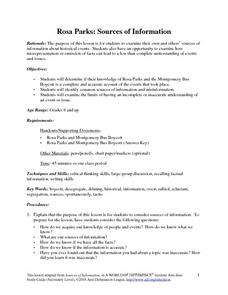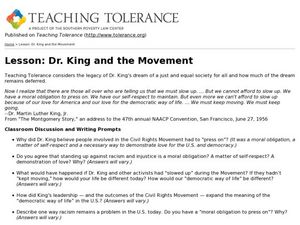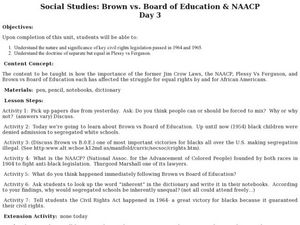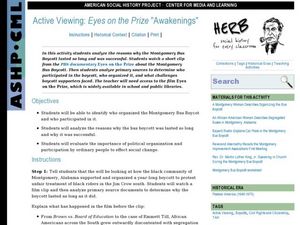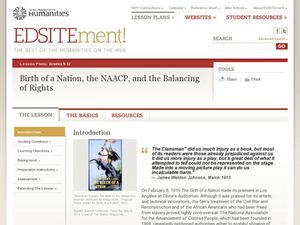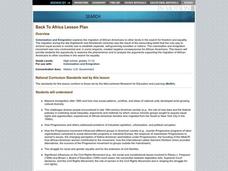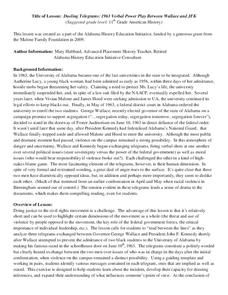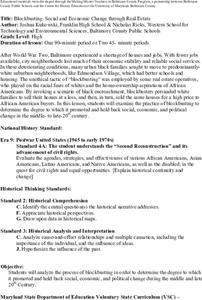C-SPAN
1968: The Poor People's Campaign
The Poor People's Campaign of 1968 marked a shift in the civil rights movement to economic issues. Speakers in four C-SPAN video clips discuss different aspects of the campaign including Resurrection City, the Economic Bill of Rights,...
Curated OER
A Comparison of Dunbar and Central High In Little Rock, Arkansas
Young sociologists analyze the needs of white and black students. They discuss how Central and Dunbar High Schools are alike and different before 1957. They write an essay comparing the two schools.
Anti-Defamation League
Rosa Parks: Sources of Information
Young scholars show what they know about Rosa Parks and the incident on one of the buses in Montgomery, Alabama. Groups discuss and identify where they receive most of their information. They examine the importance of having a complete...
Curated OER
Celebrating the Legacy of Ella Baker
Students research the life of Ella Baker and examine the importance of Civil Rights through citizen mobilization. In this rights lesson, students read the biography of Ella Baker and make suggestions of things to change in their own...
Curated OER
Dr. King and the Movement
Young scholars complete activities about Dr. Martin Luther King's Civil Rights movements. In this Civil Rights lesson, students read a quote from Dr. King and discuss several questions about the topic and may use them as writing prompts.
Curated OER
Word Search: Rosa Parks
In this civil rights worksheet, students find and circle twenty one terms associated with Rosa Parks and the Civil Rights Movement in a word search designed as a bus.
National Endowment for the Humanities
NAACP’s Anti-Lynching Campaign in the 1920s
Students investigate the anti-lynching campaign of the NAACP in the 1920's. In this human rights instructional activity, students prepare for and participate in a simulated debate of the Dyer Anti-Lynching Bill that was presented to...
Curated OER
Thurgood Marshall Makes a Difference
Students find information about the life and legal career of Thurgood Marshall, including the NAACP and its causes. They comprehend the issues and context of the Brown v. Board of Education case that Marshall argued before the U.S....
Curated OER
Brown vs. Board of Education and NAACP
Eleventh graders examine the issues surrounding Brown vs. Board of Education. In this American Government lesson, 11th graders study the key civil rights legislation passed in 1964 and 1965.
Curated OER
Active Viewing: Eyes on the Prize "Awakenings"
Dive deeper into the Montgomery Bus Boycott with this multi-stage lesson plan, centered on the essential question: Why did the boycott last so long? Historians investigate the Jim Crow south through a video clip (not included), then...
National Woman's History Museum
Ida B. Wells: Suffragist and Anti-Lynching Activist
Suffragette, investigative journalist, and civil rights activist Ida B. Wells is the focus of a instructional activity that has young historians study the work of this amazing woman. Scholars watch a video biography of Wells, read the...
PBS
The March on Washington and Its Impact
High schoolers read Martin Luther King, Jr's speech that he gave in Washington. They identify the social conditions that led to the civil rights movement. They discuss the significance of the March on Washington.
Curated OER
Jazz Music and the Crisis Over School Desegregation
High schoolers will learn to appreciate the civil rights movement with a focus on Little Rock, Arkansas. They will also acknowledge Louis Armstrong's unparalleled contributions to American music.
Curated OER
Birth of a Nation, the NAACP, and the Balancing of Rights
Eleventh graders analyze primary sources. In this US History instructional activity, 11th graders interpret written information. Students evaluate arguments and draw conclusions. Students develop and defend a...
National Endowment for the Humanities
A Journalist’s Report: The Better Vision for Black Americans
After reading a series of primary source documents detailing the teachings of Martin Luther King, Jr. and Malcolm X, class members craft newspaper columns assessing the strengths and weaknesses of each man's vision, and present their...
Curated OER
The Student Non-Violent Coordinating Committee
High schoolers are introduced to the Student Non-Violent Coordinating Committee (SNCC), one of the "big 5" civil rights organizations (the other four were: the Urban League, NAACP, SCLC, and CORE). The SNCC is credited with having led...
Curated OER
Rosa Louis Parks
Students describe Rosa Parks' contributions and how they affect us today, and identify important events occurring at this time in history.
Curated OER
Langston Hughes
Students identify similarities between Hughes' poetry and music (jazz and the blues).
Curated OER
Back To Africa
Students analyze the massive immigration after 1850 and how new social patterns, conflicts, and ideas of national unity developed amid growing cultural diversity, and how the Progressive movement influenced different groups in American...
Alabama Department of Archives and History
Dueling Telegrams: 1963 Verbal Power Play Between Wallace and JFK
Information, inferences, and innuendos. Text and subtext. Class members examine telegrams exchanged between President John F. Kennedy and Alabama Governor George Wallace, studying both what is stated and what is implied by the...
Stanford University
Beyond Vietnam
On April 4, 1967 Martin Luther King, Jr. delivered his speech "Beyond Vietnam." The controversy that followed is the focus of a three-lesson unit that asks class members to consider the political and social implications of King's...
Teaching Tolerance
Jim Crow as a Form of Racialized Social Control
Just because slavery was illegal doesn't mean it went away ... Jim Crow Laws took its place. An eye-opening lesson focuses on how Jim Crow Laws were used as a form of racial social control against African Americans in the United States....
Anti-Defamation League
The Road to Brown
As part of the study of segregation in U.S. schools, scholars research and create a timeline of events that led to the historic Supreme Court case, Brown V. Board of Education. Groups research a topic or event that led to the decision,...
Center for History Education
Blockbusting: Social and Economic Change through Real Estate
"Redlining," "Blockbusting," and "White Flight" may not be terms familiar to young historians. Here's a lesson that introduces middle schoolers to these terms and the actions associated with them. Class members examine a series of...




